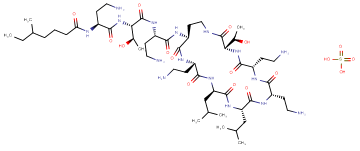
Colistin sulfate
CAS No. 1264-72-8
Colistin sulfate( —— )
Catalog No. M11108 CAS No. 1264-72-8
Colistin is a cyclic cationic decapeptide linked to a fatty acid side chain, it belongs to a group of similarly structured bacterial antimicrobial peptides.
Purity : >98% (HPLC)
 COA
COA
 Datasheet
Datasheet
 HNMR
HNMR
 HPLC
HPLC
 MSDS
MSDS
 Handing Instructions
Handing Instructions
| Size | Price / USD | Stock | Quantity |
| 100MG | 43 | In Stock |


|
| 500MG | 73 | In Stock |


|
| 1G | Get Quote | In Stock |


|
Biological Information
-
Product NameColistin sulfate
-
NoteResearch use only, not for human use.
-
Brief DescriptionColistin is a cyclic cationic decapeptide linked to a fatty acid side chain, it belongs to a group of similarly structured bacterial antimicrobial peptides.
-
DescriptionColistin is a cyclic cationic decapeptide linked to a fatty acid side chain, it belongs to a group of similarly structured bacterial antimicrobial peptides.(In Vitro):Colistins are bactericidal to gram-negative bacteria by a detergent-like mechanism. This mechanism involves interaction with lipopolysaccharides and phospholipids of the outer membrane and electrostatic interference with the outer membrane by competitively displacing divalent cations (calcium and magnesium) from the negatively charged phosphate groups of membrane lipids. Colistin (polymyxin E) owns favorable properties of rapid bacterial killing, a narrow spectrum of activity, and an associated slow development of resistance for the treatment of infections caused by multidrug-resistant gram-negative bacteria. There are two forms of colistin available commercially: colistin (sulfate) mainly for topical use and colistin methanesulfonate (sodium) for parenteral use.(In Vivo):High concentrations of colistin in rat ELF are achieved as a result of slow and sustained CMS conversion following i.t. instillation. Colistin is often used in piglets but underdosing and overdosing are frequent. Under- or overdoses of colistin do not result in any major disturbance of piglet fecal microbiota and rarely select for chromosomal resistance in the dominant E. coli population.
-
In Vitro——
-
In Vivo——
-
Synonyms——
-
PathwayImmunology/Inflammation
-
TargetCell wall
-
Recptorcell wall
-
Research AreaInfection
-
Indication——
Chemical Information
-
CAS Number1264-72-8
-
Formula Weight1253.51
-
Molecular FormulaC52H100N16O17S
-
Purity>98% (HPLC)
-
SolubilityWater: 100 mg/mL 100
-
SMILESCCC(C)CCCC(=O)N[C@@H](CCN)C(=O)N[C@@H]([C@@H](C)O)C(=O)N[C@@H](CCN)C(=O)N[C@H]1CCNC(=O)[C@@H](NC(=O)[C@@H](NC(=O)[C@@H](NC(=O)[C@@H](NC(=O)[C@H](NC(=O)[C@@H](NC1=O)CCN)CC(C)C)CC(C)C)CCN)CCN)[C@@H](C)O.OS(=O)(=O)O
-
Chemical Name——
Shipping & Storage Information
-
Storage(-20℃)
-
ShippingWith Ice Pack
-
Stability≥ 2 years
Reference
1.Evans ME, et al. Ann PharmacOthers, 1999, 33(9), 960-967.
molnova catalog



related products
-
Colistin Methanesulf...
Colistin is a cyclic polypeptide antibiotic from Bacillus colistinus, composed of Polymyxins E1 and E2.
-
Cefoxitin
Cefoxitin (Rephoxitin) is a broad-spectrum, orally available second-generation cephalosporins antibiotic. Cefoxitin interferes with the synthesis of bacterial cell walls.
-
Carbenicillin disodi...
Carbenicillin inhibits the cell-wall synthesis (peptidoglycan cross-linking) by inactivating transpeptidase on the inner surface of the bacterial cell membrane.



 Cart
Cart
 sales@molnova.com
sales@molnova.com


